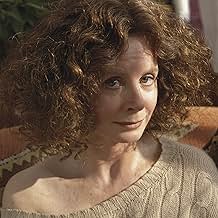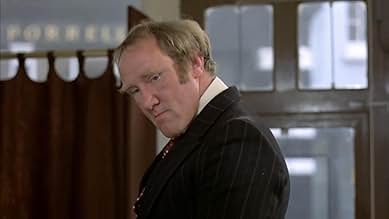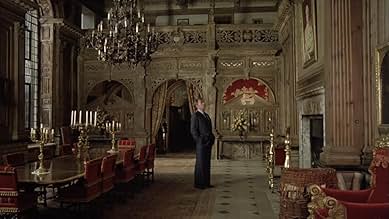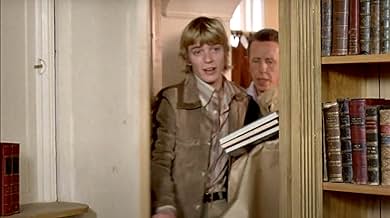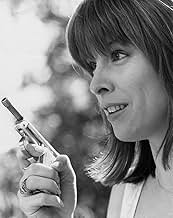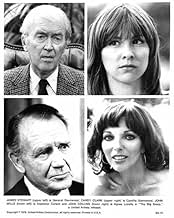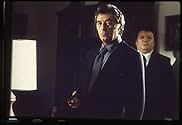Adicionar um enredo no seu idiomaA grizzled American private detective in England investigates a complicated case of blackmail-turned-murder involving a rich but honest elderly general, his two loose socialite daughters, a ... Ler tudoA grizzled American private detective in England investigates a complicated case of blackmail-turned-murder involving a rich but honest elderly general, his two loose socialite daughters, a pornographer, and a gangster.A grizzled American private detective in England investigates a complicated case of blackmail-turned-murder involving a rich but honest elderly general, his two loose socialite daughters, a pornographer, and a gangster.
- Direção
- Roteiristas
- Artistas
- Karl Lundgren
- (as Simon Turner)
- Direção
- Roteiristas
- Elenco e equipe completos
- Produção, bilheteria e muito mais no IMDbPro
Avaliações em destaque
But Richard Amsel's poster is great!
For one reason or another, Michael Winner has decided to move things over to England; although the lead man remains American. This change in location has not really had an effect on the story; but it did leave Winner free to recruit an excellent roster of British stars. Among the names in the cast list are Oliver Reed, John Mills, Joan Collins, Richard Boone and Edward Fox. The film is lead by Robert Mitchum, who while not as great as Humphrey Bogart, still makes an excellent leading man and there's also enough room in the cast for an aging James Stewart. The film is a lot shorter than the earlier version of this story and Winner has really trimmed things down a lot, which means that the story is much more straight forward than it was in the 1946 film. This is not really a bad thing as it does mean that the film is easier to follow; although it also seems less expansive. The characters take something of a backseat too, with only the lead character getting any real development. Still, this is at least an entertaining thriller and I don't feel like I wasted my time watching it; although Howard Hawks' version is better.
First of all, the plot stays true to the novel, whereas the older version had a plot ruined by the restrictions of the Hayes code, so that it contains numerous loose ends and unexplained developments.
Secondly, Robert Mitchum impersonates Marlowe much better that Humphrey Bogart. Bogart essentially recycles his role of Sam Spade in "The Maltese Falcon". Yet, Spade and Marlowe are very different characters. While Spade is a cynic who just barely remembers the remnants of morality (and Bogart is brilliant in that role), Marlowe is way beyond that point. He walks around people in a distanced, almost detached way. Only when he spots a glimpse of humanity in his fellow men, he is willing to engage himself (as with General Sternwood in "The Big Sleep"). Mitchum plays this character with great understatement, as it should be done, while Bogart makes Marlowe just another hard-boiled detective, which could be replaced by any other one.
Finally, both Sarah Miles and Candy Clark (while not being necessarily great actresses) bring over the lunacy of the Sternwood daughters beautifully. While the scenes between Bacall and Bogart a great, they are out of place in this plot, in which there is no place left for romance. It might have been appropriate for the characters of Marlowe and Linda Loring in "The Long Goodbye", but hardly in a movie adaption of a novel, in which Marlowe remarks "both Sternwood women were giving him hell".
So, while this movie transfers the plot to another time and another place, it is a much better adaption of the novel than the version often regarded as a classic.
That's where the 1978 version excels - and fails. Let's start with the fails. In the original, the scenes in the bookshops near the beginning rule with Bogie's use of humour and the electric suggested tryst with Dorothy Malone's character. Sometimes the suggestion can be erotic enough. Perhaps that's why this version skips the fun and the implied sex for another more mundane approach.
The other fail is the atmosphere. This version lacks any. The original's shadows and textures evoked each scene and created moods. This version lacks any specific mood to instead tell a story in almost a heightened reality. The direction does the same, relying on straight-ahead narrative more like a TV movie than a theatrical film.
There's so much more here that succeeds. Despite his age, Mitchum is a fine Marlow, more cynical and world-weary than Bogart's version. The script is sharp, full of humour and wry observations. The biggest improvement is the depiction of sex. Freed of the tyranny of the forties' censorship, scenes like Carmen naked and stoned are much more realistic and make a more satisfying treatment, even if the innuendo is not as predominant.
OK, it's not the classic it could've been. It's still a decent flick to rent or watch on cable. Marlowe is solid, Candy Clark is wonderfully loony, Joan Collins is pure kitsch, Richard Boone plays the essence of evil. It's good to see James Stewart, even if his gentle disposition doesn't quite match the demeanour of a General. The supporting cast are almost uniformly intriguing and fun to watch. And what a cast!
The Big Sleep may be no masterpiece but it is great fun. Relax your expectations and enjoy it for what is - fine entertainment.
It came as a surprise to me that Michael Winner was the director for the film. A man I associate with expensive dinners at expensive restaurants. But after watching this, and Death Wish, I have a new-found respect for eating in style. This film is not a Peckinpah, but it still manages to be incredibly effective in it's delivery. I like the car Mitchum drives too, a Mercedes soft-top.
The video is in widescreen by the way, requiring a screen re-adjustment or it'll look silly. Great performances from all of the actors and a superbly enjoyable plot in a film that has aged very well.
Some people criticised this film for being in the English countryside and that it doesn't bear up with the film noir style. I disagree, film noir is not limited to shady city streets, as this film goes to show.
Você sabia?
- CuriosidadesJames Stewart had difficulty saying his lines on time due to hearing and possibly memory problems. Some of the cast were shocked by his aged appearance. Robert Mitchum recalled, "The picture was all about corpses, but Jimmy looked deader than any of them." Stewart actually outlived Mitchum by one day, nearly 20 years later.
- Erros de gravaçãoWhen Marlowe takes the gun from Camilla after she unloads it on him with multiple blank rounds, he grabs the barrel with his bare hands. That should have proved to be very painful as the barrel would be extremely hot.
EDIT: This is incorrect. Blank cartridges in a small calibre gun will not heat the barrel to any great extent. A gun barrel gets hot mainly due to the friction of the bullet going through the barrel, not from the powder in the cartridge.
- Citações
Charlotte Sternwood: [when Marlowe declines to blackmail her] Wha-? You don't want money?
Philip Marlowe: Oh sure. All I itch for is money. I'm so greedy that for fifty pounds a day plus expenses on the day I work, I risk my future, the hatred of the cops, of Eddie Mars and his pals, I dodge bullets and put up with slaps and say "Thank you very much. If you have any further trouble please call me: I'll just put my card here on the table." I do all that for a few pounds. And maybe just a little bit to protect what little pride a sick and broken old man has in his family, so that he can believe his blood is not poisoned. That his little girls - though they may be a trifle wild - are not perverts and killers.
- ConexõesFeatured in James Stewart, Robert Mitchum: The Two Faces of America (2017)
Principais escolhas
Detalhes
- Data de lançamento
- Países de origem
- Idioma
- Também conhecido como
- A Morte Inevitável
- Locações de filme
- Knebworth House, Knebworth, Hertfordshire, Inglaterra, Reino Unido(Sternwood Mansion)
- Empresas de produção
- Consulte mais créditos da empresa na IMDbPro
Bilheteria
- Orçamento
- £ 3.000.000 (estimativa)


